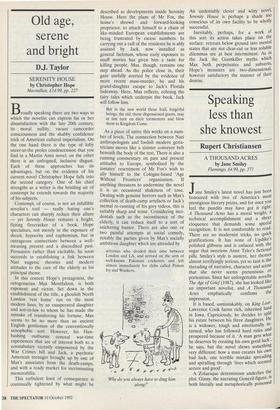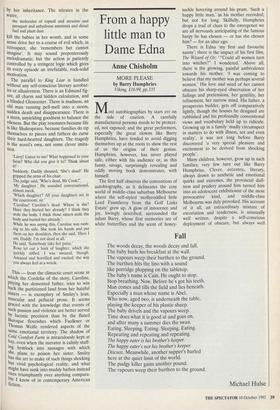Speaking less than she knowest
Rupert Christiansen
A THOUSAND ACRES by Jane Smiley Flamingo, £4.99, pp. 371 Jane Smiley's latest novel has just been honoured with two of America's most prestigious literary prizes, and for once you feel the pundits may have got it right: A Thousand Acres has a moral weight, a technical accomplishment and a sheer eloquence that demands some special recognition. It is not comfortable to read. There are no modernist tricks, no quick gratifications. It has none of Updike's polished glibness and is unlaced with the sugar that sweetens Anne Tyler's fictional pills. Smiley's style is austere, her themes almost terrifyingly serious, yet so taut is the threading of narrative, character and scene that she never seems pretentious or portentous. Since her unforgettable novella The Age of Grief (1987), she has looked like an important novelist, and A Thousand Acres emphatically confirms the impression. It is based, unmistakably, on King Lear. Lawrence Cook farms rich, inherited land in Iowa. Capriciously, he decides to split his estate between his three daughters. He is a widower, tough and emotionally in- turned, who has followed hard rules and prospered because of it. `A man gets what he deserves by creating his own good luck , he says, but the novel shows something very different: how a man creates his own bad luck, one terrible mistake spreading and spiralling through 'lives which seemed secure and good'. A Zolaesque determinism underlies the plot. Ginny, the narrating Goneril-figure, is both literally and metaphorically poisoned
by her inheritance. The nitrates in the water, the molecules of topsoil and atrazine and paraquat and anhydrous ammonia and diesel fuel and plant dust kill the babies in her womb, and in some sense drive her to a course of evil which, in retrospect, she 'remembers but cannot imagine'. It may sound preposterously melodramatic, but the action is patiently controlled by a stringent logic which gives its every episode an irrefutable, rock-solid motivation.
The parallel to King Lear is handled without any self-conscious literary acrobat-
ics or allusiveness. There is an Edmund fig- ure, all charm and hidden calculation, and a blinded Gloucester. There is madness, an old man running pell-mell into a storm, sudden death and disappearance. There is a stern, unyielding goodness to balance the vileness. But the play resonates because life is like Shakespeare, because families do rip themselves to pieces and fathers do curse their hard-hearted daughters. The tragedy is the novel's own, not some clever imita- tion.
`Larry! Listen to me! What happened to your farm? Who did you give it to? Think about it!'
Suddenly, Daddy shouted, 'She's dead!' He gripped the arms of his chair.
The judge said, 'Who's dead, Mr Cook?'
'My daughter.' He sounded conversational, almost meek.
'Which daughter? All your daughters are in the courtroom, sir.'
'Caroline! Caroline's dead. Where is she? Have they -buried her already? I think they stole the body. I think those sisters stole the body and buried her already.'
While he was saying this, Caroline was rush- ing to his side. She took his hands and put them on her shoulders, then she said. 'Here I am, Daddy. I'm not dead at all.'
He said, 'Somebody take her pulse.'
Rose let out a bark of laughter, which she quickly stifled. I was amazed, though. Amazed and horrified and excited, the way you always feel at a wreck.
This — from the climactic court scene in which the Cordelia of the story, Caroline, Pitying her demented father, tries to win back the partitioned land from her hateful sisters — is exemplary of Smiley's lean, muscular and pellucid prose. It seems graced with the knowledge that events of such passion and violence are better served by laconic precision than by the fluted Baroque flourishes which Faulkner or Thomas Wolfe rendered aspects of the same emotional territory. The shadow of Cold Comfort Farm is miraculously kept at bay, even when the narrator is calmly stuff- ing hemlock into sausages with which she plans to poison her sister. Smiley has the art to make of such things shocking but vivid psychological reality; and what Might have sunk into muddy bathos instead rises triumphantly over anything compara- ble I know of in contemporary American fiction.



























































 Previous page
Previous page